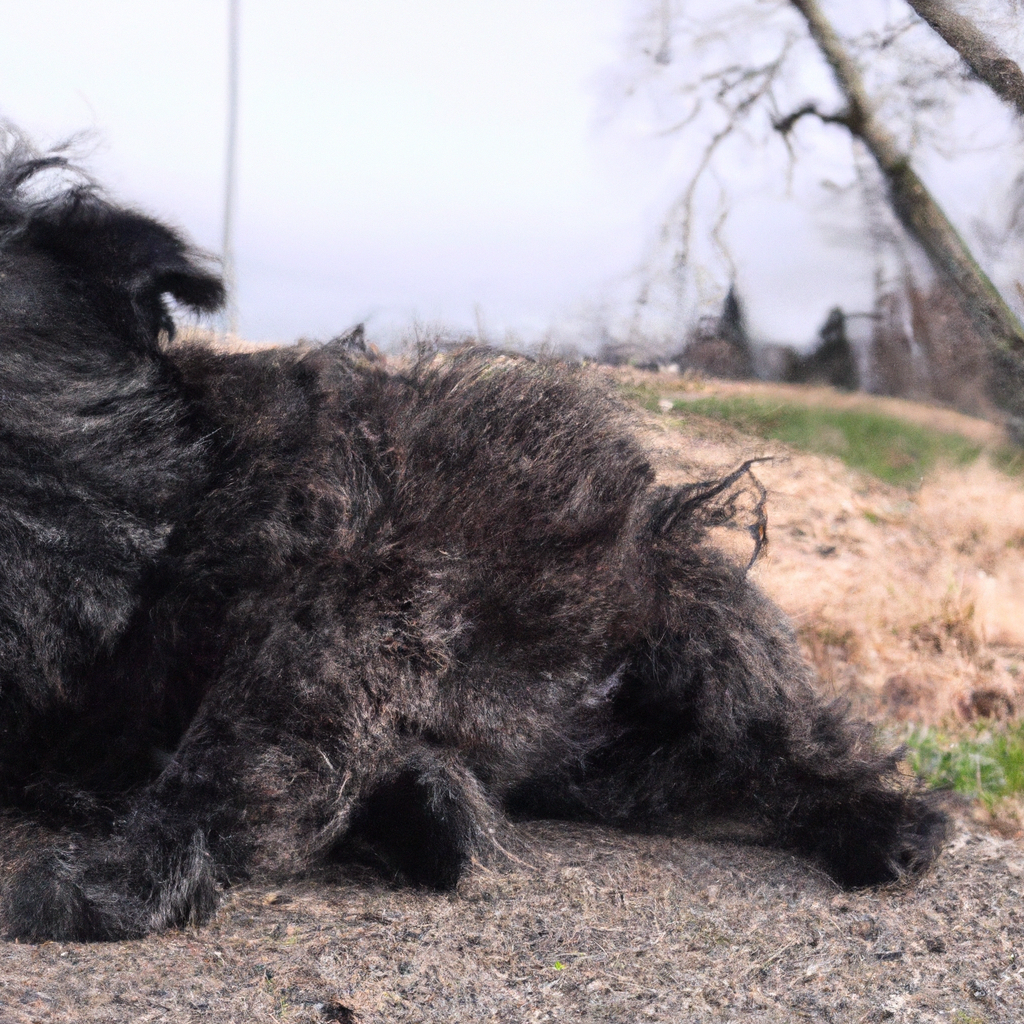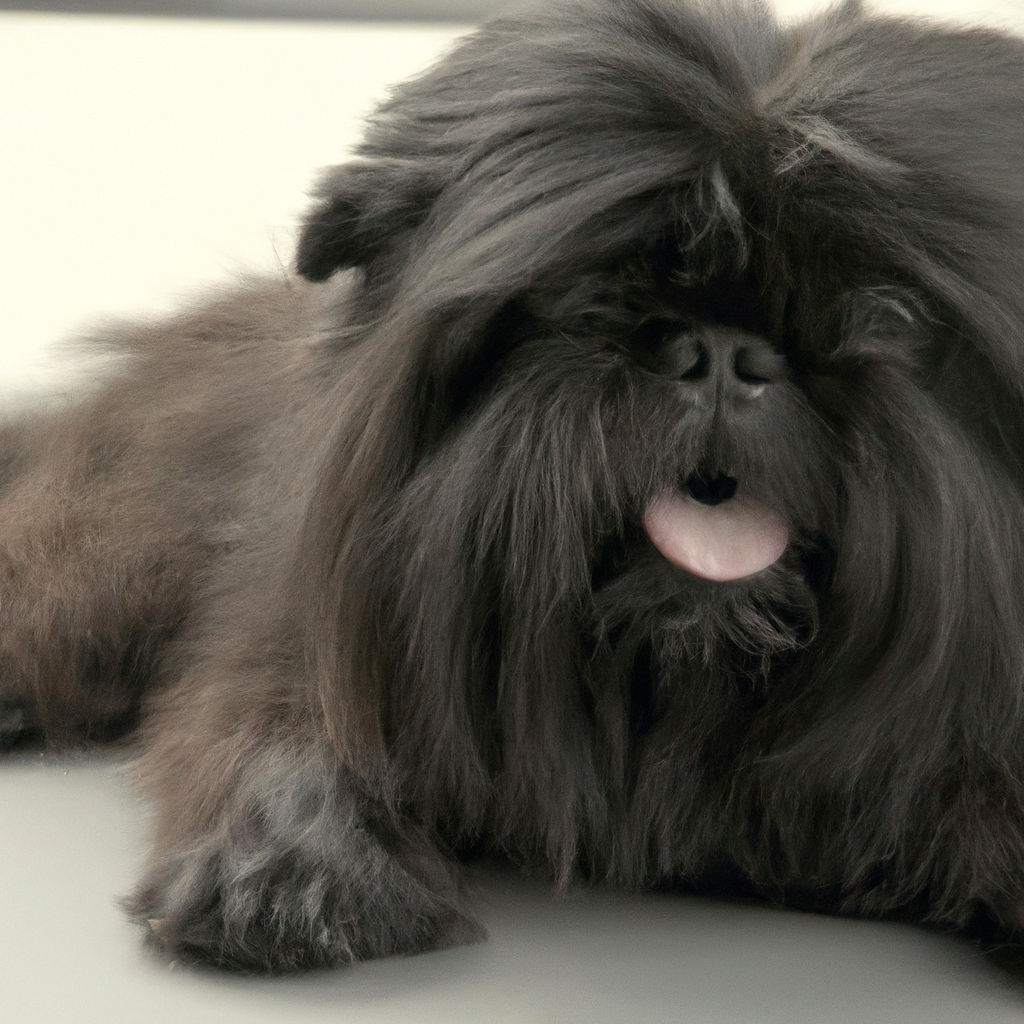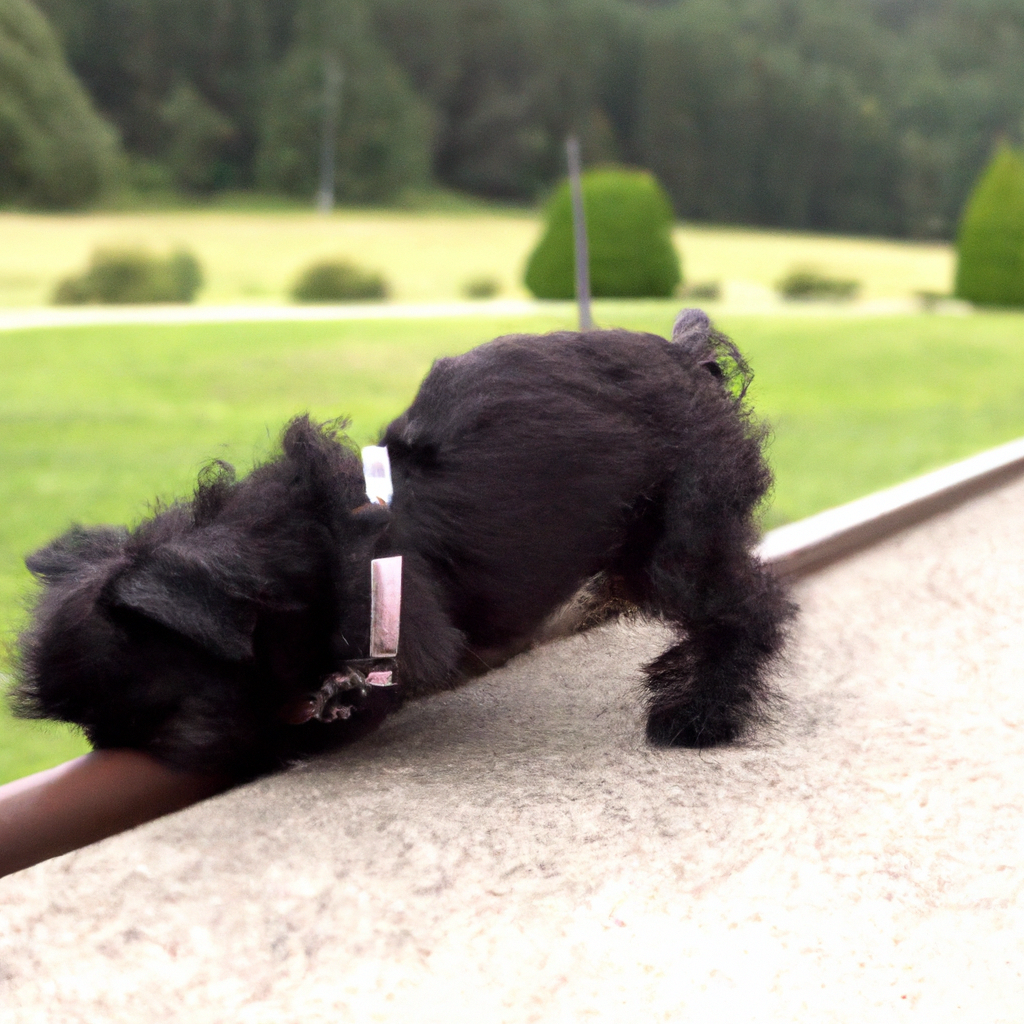Affenpinschers, a small breed of dog known for their distinctive “monkey-like” appearance, are generally known for their longevity. With a typical lifespan of 12 to 15 years, they can indeed live a long life, especially when compared to larger dog breeds. Their lifespan can be influenced by various factors including diet, exercise, and genetic health conditions. Regular veterinary care also plays a crucial role in ensuring a long, healthy life for Affenpinschers.
Understanding the Lifespan of Affenpinschers
Affenpinschers, often referred to as “Monkey Dogs” due to their distinctive, primate-like appearance, are a small breed of dog that originated in Germany. These dogs are known for their playful, adventurous nature, and their ability to form strong bonds with their human companions. But one question that often arises among potential Affenpinscher owners is: Can Affenpinschers live a long life?
The answer, in short, is yes. Affenpinschers are generally a long-lived breed, with an average lifespan of 12 to 15 years. However, like any breed, the lifespan of an Affenpinscher can be influenced by a variety of factors, including genetics, diet, exercise, and overall health care.
Genetics play a significant role in determining the lifespan of an Affenpinscher. Some lines of Affenpinschers may be prone to certain health conditions that can affect their longevity. For instance, some Affenpinschers may be genetically predisposed to heart conditions or hip dysplasia, both of which can potentially shorten their lifespan. Therefore, if you’re considering adding an Affenpinscher to your family, it’s important to research the breed and choose a reputable breeder who prioritizes health and longevity in their breeding program.
Diet and exercise are also crucial factors in the lifespan of an Affenpinscher. These dogs are energetic and require regular exercise to maintain their health and vitality. A balanced diet rich in high-quality proteins, fruits, vegetables, and whole grains can help to keep an Affenpinscher healthy and extend their lifespan. Avoid feeding your Affenpinscher a diet high in processed foods, as these can lead to obesity and other health problems.
Regular veterinary care is another key component in ensuring a long life for an Affenpinscher. Regular check-ups can help to catch any potential health issues early, before they become serious problems. Vaccinations, dental care, and preventative treatments for parasites are all important aspects of maintaining an Affenpinscher’s health.
Despite their small size, Affenpinschers are known for their robust health and resilience. However, they are not immune to health issues. Some common health problems in Affenpinschers include hip dysplasia, heart conditions, and eye problems. Regular veterinary check-ups can help to catch these issues early and provide treatment, potentially extending the lifespan of the dog.
In conclusion, while there are no guarantees in life, Affenpinschers are generally a long-lived breed. With proper care, a balanced diet, regular exercise, and regular veterinary check-ups, an Affenpinscher can live a long, healthy life. As with any pet, owning an Affenpinscher requires a commitment to their health and well-being. But for those who are willing to make this commitment, the rewards of sharing your life with an Affenpinscher can be immeasurable. These charming, playful dogs can bring joy, companionship, and a touch of mischief into your life for many years to come.
Factors Influencing the Longevity of Affenpinschers
Affenpinschers, affectionately known as “Monkey Dogs,” are a small but mighty breed. These feisty, fun-loving dogs are known for their playful personalities and distinctive, scruffy appearance. But one question that often arises among potential Affenpinscher owners is, “Can Affenpinschers live a long life?” The answer is a resounding yes, with many factors influencing the longevity of this unique breed.
Firstly, genetics play a significant role in the lifespan of Affenpinschers. Like all dogs, they are susceptible to certain health conditions. However, Affenpinschers are generally a healthy breed, with a life expectancy of 12 to 15 years. Some have even been known to live into their late teens. This is largely due to the breed’s robust genetic makeup, which is less prone to some of the health issues that can affect other breeds.
However, genetics aren’t the only factor at play. Diet and exercise are also crucial to an Affenpinscher’s longevity. These energetic dogs require a balanced diet to maintain their health and vitality. High-quality dog food, rich in protein and low in fillers, can help keep an Affenpinscher in peak condition. Regular exercise is also essential. Despite their small size, Affenpinschers are active and agile, and they need daily physical activity to stay fit and healthy.
In addition to diet and exercise, regular veterinary care is another key factor in an Affenpinscher’s lifespan. Regular check-ups can help catch any potential health issues early, increasing the chances of successful treatment and a longer life. Vaccinations and preventative treatments for parasites are also important for keeping an Affenpinscher healthy.
Moreover, the environment in which an Affenpinscher lives can also influence its lifespan. These dogs are adaptable and can thrive in various living situations, from apartments to larger homes with yards. However, they are sensitive to extreme temperatures, so it’s important to provide a comfortable and safe environment for them. Affenpinschers also thrive on companionship. They are social animals that enjoy being part of the family, and a loving, nurturing home can contribute to their overall well-being and longevity.
Lastly, mental stimulation is just as important as physical health when it comes to the lifespan of Affenpinschers. These intelligent dogs need mental challenges to keep their minds sharp. This can be achieved through training, puzzle toys, and interactive games. A mentally stimulated Affenpinscher is a happy Affenpinscher, and a happy dog is often a healthier, longer-lived dog.
In conclusion, while genetics do play a role in the lifespan of Affenpinschers, there are many other factors at play. A balanced diet, regular exercise, veterinary care, a safe and comfortable environment, and mental stimulation all contribute to the longevity of this delightful breed. So, if you’re considering adding an Affenpinscher to your family, you can look forward to many years of companionship with this lively, loving breed.
How to Promote Longevity in Affenpinschers
Affenpinschers, affectionately known as “Monkey Dogs” due to their primate-like appearance and playful nature, are a small breed of dog that originated in Germany. These adorable, energetic, and loyal companions have a lifespan that typically ranges from 12 to 15 years. However, with the right care and attention, it’s possible for Affenpinschers to live even longer, healthier lives.
Firstly, a balanced diet is crucial for the longevity of Affenpinschers. Like all dogs, they require a diet rich in protein, carbohydrates, and healthy fats. However, due to their small size, they don’t need a large quantity of food. Overfeeding can lead to obesity, which can shorten their lifespan and lead to health issues such as diabetes and heart disease. Therefore, it’s important to feed them the right amount of high-quality dog food, and avoid giving them too many treats or human food, which can be harmful to their health.
Regular exercise is another key factor in promoting longevity in Affenpinschers. These energetic dogs love to play and need daily physical activity to keep them fit and healthy. Regular walks, playtime in the yard, or even indoor games can help keep their weight in check and their muscles strong. However, due to their small size and brachycephalic (short-nosed) nature, it’s important not to over-exercise them, especially in hot weather, as they can be prone to overheating.
Regular vet check-ups are also essential for the long-term health of Affenpinschers. These visits can help detect any potential health issues early, which can significantly increase the chances of successful treatment and recovery. Affenpinschers are generally healthy dogs, but they can be prone to certain health issues such as hip dysplasia, heart problems, and eye conditions. Regular vaccinations and preventative treatments for parasites are also important to keep them healthy.
Grooming is another aspect of care that can contribute to the longevity of Affenpinschers. Regular brushing can help keep their wiry coat healthy and free from mats, while regular dental care can prevent oral health issues, which can lead to other serious health problems if left untreated.
Mental stimulation is just as important as physical health for Affenpinschers. These intelligent dogs love to play and learn, and keeping their minds active can help prevent behavioral issues and keep them happy and healthy. Training, puzzle toys, and interactive games can all provide mental stimulation for these clever dogs.
Lastly, a loving and stress-free environment can significantly contribute to the longevity of Affenpinschers. These dogs are very social and thrive on companionship. They love to be part of the family and involved in daily activities. Providing them with plenty of love, attention, and a safe, comfortable home can help them live a long, happy life.
In conclusion, while the lifespan of Affenpinschers typically ranges from 12 to 15 years, with the right care and attention, it’s possible for these adorable dogs to live even longer. A balanced diet, regular exercise, regular vet check-ups, grooming, mental stimulation, and a loving environment can all contribute to the longevity of Affenpinschers. So, if you’re lucky enough to share your life with one of these delightful dogs, following these tips can help ensure that you enjoy many happy years together.
The Role of Genetics in Affenpinschers’ Lifespan

Affenpinschers, affectionately known as “Monkey Dogs” due to their distinctive, primate-like appearance, are a small breed of dog that originated in Germany. These dogs are known for their playful, energetic nature, and their ability to form strong bonds with their human companions. But one question that often arises among potential Affenpinscher owners is: Can Affenpinschers live a long life? The answer to this question is largely dependent on a variety of factors, one of the most significant being genetics.
Genetics play a crucial role in determining the lifespan of Affenpinschers. Like all dogs, Affenpinschers inherit a set of genes from their parents that can influence their health and longevity. Some of these genes may predispose them to certain health conditions, while others may contribute to their overall vitality and longevity.
For instance, Affenpinschers are known to be genetically predisposed to certain health issues such as hip dysplasia, heart disease, and respiratory problems. These conditions, if not properly managed, can significantly shorten an Affenpinscher’s lifespan. On the other hand, Affenpinschers also inherit genes that contribute to their robust health and longevity. These include genes that promote a strong immune system, efficient metabolism, and a healthy coat and skin.
However, it’s important to note that genetics is not the sole determinant of an Affenpinscher’s lifespan. Environmental factors and lifestyle choices also play a significant role. For example, a well-balanced diet, regular exercise, and routine veterinary check-ups can help mitigate the risk of health issues and extend an Affenpinscher’s lifespan. Similarly, exposure to harmful environmental factors such as pollution or toxic substances can negatively impact their health and longevity.
Moreover, the role of responsible breeding cannot be overstated when it comes to the lifespan of Affenpinschers. Reputable breeders prioritize the health of their dogs and take steps to minimize the risk of genetic diseases. They do this by conducting health screenings and genetic testing on their breeding dogs to ensure they are not passing on harmful genes to their offspring. This practice not only helps to produce healthier puppies but also contributes to the overall longevity of the breed.
So, can Affenpinschers live a long life? The answer is a resounding yes. With good genetics, a healthy lifestyle, and responsible breeding practices, Affenpinschers can enjoy a long and happy life. On average, Affenpinschers live between 12 to 15 years, which is relatively long compared to other breeds. However, it’s not uncommon for Affenpinschers to live well into their late teens with proper care and attention.
In conclusion, while genetics play a significant role in determining the lifespan of Affenpinschers, they are not the only factor. Environmental factors, lifestyle choices, and responsible breeding practices also contribute significantly to their longevity. Therefore, if you’re considering adding an Affenpinscher to your family, it’s important to choose a reputable breeder who prioritizes the health of their dogs and to provide your Affenpinscher with a healthy lifestyle to ensure they live a long and happy life.
Nutrition and Its Impact on Affenpinschers’ Life Expectancy
Affenpinschers, affectionately known as “Monkey Dogs,” are a small but mighty breed. These feisty, fun-loving dogs are known for their playful personalities and distinctive, scruffy appearance. But one question that often arises among potential Affenpinscher owners is, “Can Affenpinschers live a long life?” The answer is a resounding yes, with the right care and nutrition.
Nutrition plays a pivotal role in the life expectancy of Affenpinschers. Just like humans, dogs require a balanced diet to maintain their health and vitality. The right nutrition can help prevent a variety of health issues, including obesity, heart disease, and diabetes, all of which can significantly impact an Affenpinscher’s lifespan.
Affenpinschers, despite their small size, are energetic and active dogs. They require a diet rich in protein to support their muscle development and sustain their energy levels. High-quality dog food that lists a source of animal protein, like chicken or beef, as the first ingredient is typically a good choice.
However, protein alone isn’t enough. Affenpinschers also need a balanced mix of carbohydrates for energy, fats for a healthy coat and skin, and a variety of vitamins and minerals for overall health. Fruits, vegetables, and whole grains can provide these essential nutrients.
While it’s important to ensure your Affenpinscher is getting the right nutrients, it’s equally important to monitor their calorie intake. Affenpinschers are small dogs, and it doesn’t take much for them to become overweight. Obesity can lead to a host of health problems, including joint issues, heart disease, and a shortened lifespan.
Portion control is key when feeding an Affenpinscher. It’s easy to overfeed these little dogs, especially when they look at you with those pleading eyes. But resist the temptation to give in to their begging. Instead, stick to a regular feeding schedule and measure out their food to ensure they’re getting the right amount.
Treats can also be a source of extra calories. While it’s fine to give your Affenpinscher a treat now and then, make sure treats don’t make up more than 10% of their daily calorie intake. And when you do give them a treat, opt for healthy options like pieces of fruits or vegetables.
Regular vet check-ups are also crucial in maintaining your Affenpinscher’s health and longevity. Your vet can provide personalized advice on your dog’s nutritional needs based on their age, weight, and overall health. They can also help you catch any potential health issues early, which can significantly increase your Affenpinscher’s life expectancy.
In conclusion, yes, Affenpinschers can live a long life, with the average lifespan ranging from 12 to 15 years. However, this isn’t a guarantee. The lifespan of an Affenpinscher, like any dog, can be influenced by a variety of factors, including genetics, environment, and lifestyle. But with the right nutrition and care, you can significantly increase the chances of your Affenpinscher living a long, healthy life. So, pay attention to what you’re feeding your furry friend, and remember, a healthy Affenpinscher is a happy Affenpinscher.
Exercise and Its Effect on Affenpinschers’ Longevity
Affenpinschers, affectionately known as “Monkey Dogs” due to their distinctive, primate-like appearance, are a small but robust breed of dog that can indeed live a long life. With a typical lifespan of 12 to 15 years, these little canines can provide their owners with many years of companionship and joy. However, like all breeds, the longevity of an Affenpinscher is influenced by a variety of factors, including diet, genetics, and healthcare. One factor that is often overlooked, but is of paramount importance, is exercise.
Exercise plays a crucial role in the overall health and longevity of Affenpinschers. These dogs are known for their energy and playfulness, and regular physical activity helps them maintain a healthy weight, which is essential for their long-term health. Obesity can lead to a host of health problems in dogs, including heart disease, diabetes, and joint issues, all of which can significantly shorten their lifespan. Regular exercise can help prevent these issues, ensuring your Affenpinscher stays fit and healthy for as long as possible.
But it’s not just about physical health. Exercise also plays a vital role in an Affenpinscher’s mental well-being. These dogs are intelligent and curious, and without sufficient stimulation, they can become bored and anxious. This can lead to destructive behaviors and stress-related health issues, which can also impact their lifespan. Regular exercise, particularly activities that challenge them mentally as well as physically, can help keep an Affenpinscher’s mind sharp and their spirits high.
So, what kind of exercise is best for an Affenpinscher? These dogs are adaptable and can thrive in a variety of environments, from city apartments to country homes. They don’t require as much exercise as larger breeds, but they still need regular physical activity to stay healthy. A daily walk is a must, but they also enjoy games of fetch, agility training, and even swimming. It’s important to remember, though, that Affenpinschers are a brachycephalic breed, meaning they have a short snout and can struggle with intense exercise or hot weather. Therefore, it’s best to keep exercise sessions short and sweet, and always provide plenty of water and shade.
In addition to regular exercise, it’s also important to provide your Affenpinscher with a balanced diet, regular vet check-ups, and plenty of love and attention. These factors, combined with a suitable exercise regime, can help ensure your Affenpinscher lives a long, happy, and healthy life.
In conclusion, while Affenpinschers are naturally a long-lived breed, their lifespan can be significantly influenced by the amount and type of exercise they receive. Regular, appropriate exercise can help prevent obesity and related health issues, keep their minds sharp, and improve their overall quality of life. So, if you’re the proud owner of an Affenpinscher, or considering adding one to your family, remember the importance of exercise in their daily routine. It’s not just about adding years to their life, but also about adding life to their years.
Common Health Issues in Affenpinschers and Their Impact on Lifespan
Affenpinschers, affectionately known as “Monkey Dogs” due to their distinctive, primate-like appearance, are a small but robust breed. They are known for their playful, adventurous spirit, and their loyalty to their human companions. But, like any breed, they have their own set of health issues that can impact their lifespan. So, can Affenpinschers live a long life? The answer is yes, but it’s important to understand the common health issues they may face and how these can affect their longevity.
One of the most common health issues in Affenpinschers is hip dysplasia, a condition where the hip joint doesn’t fit together properly, causing pain and mobility issues. This condition can significantly impact an Affenpinscher’s quality of life, and in severe cases, it can shorten their lifespan. However, with early detection and appropriate treatment, many Affenpinschers with hip dysplasia can still lead active, happy lives.
Another health issue that can affect Affenpinschers is a condition known as patellar luxation. This is when the kneecap dislocates or moves out of its normal position, causing discomfort and difficulty walking. While this condition can be painful, it’s usually not life-threatening. However, it can limit an Affenpinscher’s activity level, which can lead to weight gain and other health problems.
Heart disease is also a concern for Affenpinschers. They are prone to a condition called mitral valve disease, which affects the heart’s ability to pump blood effectively. This can lead to symptoms such as coughing, fatigue, and difficulty breathing. If left untreated, it can significantly shorten an Affenpinscher’s lifespan. However, with regular veterinary check-ups and appropriate treatment, many Affenpinschers with heart disease can live long, fulfilling lives.
Eye problems are another common health issue in Affenpinschers. They are prone to conditions such as cataracts and progressive retinal atrophy, both of which can lead to vision loss. While these conditions can impact an Affenpinscher’s quality of life, they are usually not life-threatening. However, regular eye exams are crucial to catch these conditions early and manage them effectively.
Despite these potential health issues, it’s important to remember that every Affenpinscher is unique. Not all Affenpinschers will develop these conditions, and many live long, healthy lives. The average lifespan of an Affenpinscher is around 12 to 14 years, but with good care, many live well into their teens and some even into their early twenties.
The key to a long, healthy life for an Affenpinscher is regular veterinary care. Regular check-ups can help catch potential health issues early, before they become serious problems. A healthy diet and regular exercise are also crucial for keeping an Affenpinscher in good shape.
In conclusion, while Affenpinschers do have their share of breed-specific health issues, these don’t necessarily mean a shortened lifespan. With proper care, regular veterinary check-ups, and a lot of love, Affenpinschers can indeed live a long, happy life. So, if you’re considering adding an Affenpinscher to your family, don’t let potential health issues deter you. These little dogs have a lot of love to give, and with the right care, they can be a wonderful, long-lived companion.
The Truth About Affenpinschers’ Lifespan: Myths and Facts
Affenpinschers, often referred to as “Monkey Terriers” due to their distinct primate-like appearance, are a breed of toy dogs that have captured the hearts of many pet lovers worldwide. Their playful demeanor, coupled with their unique looks, make them a popular choice for those seeking a small, lively companion. But one question that often arises among potential Affenpinscher owners is: Can Affenpinschers live a long life?
The answer is a resounding yes. Affenpinschers are known for their relatively long lifespan compared to other breeds. On average, a healthy Affenpinscher can live between 12 to 15 years, and some have even been known to reach the ripe old age of 17. However, like any other breed, their lifespan can be influenced by various factors such as genetics, diet, exercise, and overall health care.
One common myth about Affenpinschers is that they are prone to numerous health issues due to their small size. While it’s true that they can be susceptible to certain conditions like hip dysplasia, heart disease, and dental problems, these are not exclusive to the breed. In fact, with regular vet check-ups and a balanced diet, these issues can be managed effectively, ensuring your Affenpinscher lives a long, healthy life.
Another misconception is that Affenpinschers, due to their high energy levels, require excessive amounts of exercise which can lead to early burnout and a shortened lifespan. While they are indeed an active breed, they don’t require as much physical activity as larger, more energetic breeds. Regular walks and playtime are usually enough to keep them happy and healthy. Over-exercising them can actually be detrimental to their health, so it’s important to strike a balance.
The quality of diet also plays a crucial role in an Affenpinscher’s lifespan. Feeding them a balanced, nutritious diet can significantly improve their health and longevity. Avoid feeding them table scraps or foods high in sugar and fat. Instead, opt for high-quality dog food that is specifically formulated for small breeds.
Regular vet check-ups are also essential in ensuring your Affenpinscher lives a long life. Regular health screenings can help detect any potential health issues early, allowing for prompt treatment and management. Dental care is particularly important for this breed, as they are prone to dental diseases. Regular brushing and professional cleanings can help prevent these issues.
Lastly, genetics can also influence an Affenpinscher’s lifespan. If you’re getting your Affenpinscher from a breeder, make sure they are reputable and prioritize the health of their dogs. A good breeder will be able to provide you with health clearances for both of the puppy’s parents, which can give you an idea of any potential health problems your Affenpinscher might inherit.
In conclusion, while Affenpinschers are known for their long lifespan, it’s important to remember that their longevity is not guaranteed. It can be influenced by various factors such as diet, exercise, health care, and genetics. However, with proper care and attention, there’s no reason why your Affenpinscher can’t live a long, happy life. So, if you’re considering adding an Affenpinscher to your family, rest assured that with the right care, you’ll have a loyal companion for many years to come.Affenpinschers can live a long life as their average lifespan is between 12 to 15 years, which is relatively long compared to other dog breeds. However, like all breeds, their lifespan can be influenced by their overall health, diet, and care.





